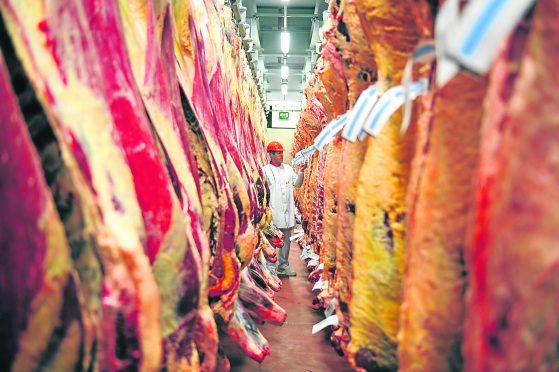A hard Brexit would have a “catastrophic” impact on the European meat industry according to a new report by UECBV, the federation which represents 20,000 livestock and meat companies across EU member states.
The report modelled the impact of a hard Brexit on trade between the UK and EU for meat products and found that increased costs imposed by tariff barriers, additional veterinary checks and increased transport costs would lead to a reduction of trade in meat from EU to UK by up to 84% for beef, 76% for sheep meat and 48% for pig meat.
It estimates that the price shock would decrease the value of EU meat production by 2.4billion euros for beef and 2.3billion euros for pig meat and result in the loss of at least 32,000 jobs.
UECBV chairman Philippe Borremans said a hard Brexit had a potential impact that was much greater than the Russian import ban.
“By potentially cutting off one of the largest and highest value meat markets in Europe, Brexit threatens to be catastrophic for industry across Europe and UK. In this worst case scenario, in which no deal between EU and UK is agreed, the impact to the meat sector will be devastating, due to the particular exposure of this sector to tariff burden, additional veterinary costs and increased customs and transport checks and associated logistics disruption,” he said.
“The findings contained in this report confirm our worst fears: a hard Brexit would send shockwaves through the whole European meat industry, destroying jobs, increasing consumer prices, and devastating the livelihoods of small business owners working in our sector. The scale of this crisis is simply too great to ignore, and we implore policymakers to follow through on recommendations put forward in this report and to protect this vital European food sector.”
The report recommends a long transition period to allow businesses to adjust to new arrangements, continued regulatory convergence between UK and EU, increased market access, simplified transit systems and investment in port facilities
The Scottish Association of Meat Wholesalers (SAMW) welcomed UECBV’s input and urged EU and UK negotiators to address the issues raised in the report.
In a statement SAMW said; “Our challenge to the UK and Scottish governments is to pursue a plan which maximises the advantages and opportunities which will arise throughout the duration of the UK’s Brexit transition, and which establishes a production and business platform for post-EU Britain which will enable the industry to grow its domestic and export markets.
“In detailing the Brexit-based risks and threats to Europe’s red meat industry, the UECBV report highlights the vital need for negotiators to deliver a fair and balanced deal which is acceptable to both sides. While the UK clearly needs the EU as a long-term trading partner, the same definitely applies to the EU’s need for a lasting trading partnership with the UK.
